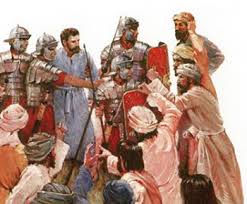Paul’s Witness before the Jews
21:17 to 23:22
57 AD
In a sense all of 21:17 to 26:32 could be described as Paul’s witness before the Jews, since even in the Caesarea trial scenes of Chapters 24 to 26, Paul appeared before a Jewish legal team and a Jewish king. However, the Roman officials have a more conspicuous presence in those chapters. First, he appeared with the elders of the Messianic community in Jerusalem. There he experienced something of a mini-trial even before them, as they urged him to demonstrate his faithfulness to those Jewish believers who were zealots on behalf of the Torah (to see link click Cn – Paul’s Advice from Jacob and the Elders at Jerusalem). To comply with their wishes, he sponsored four Jewish men completing their Nazirite vows at the Temple. There Paul was falsely accused of some Asian Jews of having violated the middle wall of separation between Jews and Gentiles, and a riot ensued (see Co – Paul’s Arrest in Jerusalem).

Rescued from certain death at the hands of the mob, Paul requested from the arresting Roman commander permission to address them. When permission was granted, Paul delivered a moving speech before his hostile Jewish audience (see Cp – Paul’s Testimony on the Temple Steps on Fort Antonia). They listened intently as Paul spoke of his Jewish background and of being Torah observant. But then he told them about his experience on the Damascus road. Only when he mentioned Yeshua’s commission for his witness to the Gentiles did they become a mob again, and Paul had to be quickly taken away again by the Romans.
In an attempt to find out more about the causes of the riot, the Roman commander instead learned of Paul’s Roman citizenship (see Cq – Paul is Protected by Roman Law). The commander then led Paul to the Sanhedrin in his attempt to ascertain the Jewish complaint against him. With Paul’s mention of the resurrection, the Sanhedrin session ended in utter chaos, with Sadducee pitted against Pharisee (see Cr – Paul’s Defense Before the Great Sanhedrin). When Paul’s nephew learned of a plot by forty Jews to ambush Paul, he warned the Roman commander of it (see Cs – The Conspiracy to Kill Paul).
The narrative is long and given in considerable detail. That Luke considered this material especially significant is demonstrated by the slowness of the time in the narrative. Less than twelve days elapsed between the time between Paul received advice from the Jerusalem elders about sponsoring four Jewish men completing their Nazarite vows, and his being escorted to Caesarea to face the Roman Governor Felix. In contrast, the events of the next three chapters cover two years (24:27).496



Leave A Comment